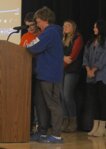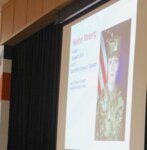Stanley-Boyd Schools took time out to observe Veterans Day with an in-school program on Friday, Nov. 10.
With a welcome for veterans by students and a veteran’s dinner under the direction of …
This item is available in full to subscribers.
To continue reading, you will need to either log in, using the login form, below, or purchase a new subscription.
If you are a current print subscriber, you can set up a free website account and connect your subscription to it by clicking here.
Otherwise, click here to view your options for subscribing.
Please log in to continue |




Stanley-Boyd Schools took time out to observe Veterans Day with an in-school program on Friday, Nov. 10.
With a welcome for veterans by students and a veteran’s dinner under the direction of Kari Thorpe, the school lobby was decked out with banners Nov. 10, including one over the hallway leading from the dinner site to gym that paid tribute to all military branches.
Convening at 2 p.m. in the high school gymnasium with veterans entrance, flags were carried in by VFW and Legion representatives Bruce Wozniak, Ben Niedzwiecki and Brandon Heifner, being saluted as placed in the northeast corner of the gym. High school student Dakota Derks led those assembled in the Pledge of Allegiance, followed by a welcome for veterans led by Taniele Ducommun.
Following recognition of each service branch present by asking them to stand when their branch was called, the gathering took a brief time to recognize veteran support of Badger Boys and Girls State, a statewide effort to promote civics education and give real world experience to tomorrow’s public servants at home.
Attending this year for Stanley-Boyd were Vaughn Schneider, Blake Paul, and Taniele Ducommun, each sharing their experience in turn. Schneider shared in part how he had done various tasks associated with running for public office, ultimately winning the post of mayor.
Following remarks from the Badger Boys and Girls State attendees, the high school choir sang “The Battle Hymn of the Republic” under direction of Louella Derrico. Following this, a series of middle schoolers (Evelyn Czubakowksi, Dayne Hazelton, Morgan Gundlach, Samantha Gully, Aiden Kaiser, Parker Bates, Ady Charles and Kadence Tetzlaff) read poems about the meaning of Veteran’s Day, as a projector screen at center stage showed photos of veterans both current and past, serving and/or stationed at Italy, Iraq, and Pearl Harbor, among other places. High school social studies teacher Bob Seidl then introduced the main speaker, Dave Mayenschein of Thorp.
Today a dairy farmer and member of VFW Post 9057 at Thorp, Mayenschein shared with those present his experience of being drafted for Vietnam in 1966 after first working at a foundry out of high school, becoming a member of the 101st Airborne and arriving at the start of the Tet Offensive.
“If you want to talk about hell, that was it,” Mayenschein said of the offensive launched by North Vietnam at the start of the lunar new year in Vietnam.
Following the Ho Chi Minh Trail through Laos and Cambodia to get around the demilitarized zone that had been set up between North and South, the Tet Offensive began January 4, 1968 and was an effort by the North Vietnamese army and Viet Cong to invade the major cities and take ground. It failed at its tactical aims of holding territory, but shocked public opinion and sowed doubt in the United States about winning the war. The 101st Airborne was thrown in the thick of the fight. Mayenschein, a grenadier with the 101st Airborne, was candid about the details of war. Within days of arrival, Mayenschein’s platoon of 18 was down to five or six, receiving new men. The 101st Airborne would be flown each day to where the fighting was, receiving a hot meal each day except for one three-day stretch where it was feared that delivery would give away their position. Apart from food concerns the rice paddies of Vietnam had leeches in them and the helicopters are affected by the heat, meaning that if they couldn’t lift off “someone had to get off.” Snakes were common and poisonous, with the phrase “Vietnam two stepper” referring to the sentiment that if one got bit by a snake, it was “two steps and you’re dead.”
In spite of having a professed fear of snakes Mayenschein showed courage under fire. Following an incident where Mayenschein showed battle prowess helping rescue a lieutenant, he was approached by Second Lieutenant Richard W. Pershing, grandson of the leader of American Expeditionary Forces in World War I.
“You’re not afraid to fight,” Pershing told Mayenschein, saying that he would stick close and later that he would put the Thorp native in for a silver star.
Realities of war being what they are, that never happened. Second Leiutenant Pershing was killed February 17, 1968 after what was described in news reports at the time as “wounds received on a combat mission when his unit came under hostile small-arms and rocket attack while searching for remains of a missing member of his unit.” Mayenschein had been evacuated days earlier for wounds received in battle, but not before taking what he at first thought was a “direct hit” from a mortar. The facts were little worse.
On February 4 before dawn, he and other soldiers had their fox holes blown in, after a perimeter breach from outside led to grenades being dropped in each foxhole. Also touched on Friday was the way that politics played a role in the fighting during Vietnam. With Mayenschein’s unit coming under attack and returning fire, the order was given to cease as the enemy retreated beyond range.
“We can’t hit them because that belongs to the British,” it was explained by the one making the cease fire call. “It’s a rubber plantation.”
“What the h--- kind of war is this?” one of the soldiers present (not Mayenschein) replied in disgust.
With the 101st Airborne playing an important role in turning back the North Vietnamese and Viet Cong and taking heavy losses for this, the Tet Offensive was defeated militarily but not strategically, as it sowed doubt about the U.S. and its ability to win. From there the Paris Peace Talks started, resulting in the signing of the Paris Peace Accords to end the war on January 27, 1973, the fall of Saigon coming later in 1975.
With those returned from war often carrying hidden wounds and 22 veterans a day lost to suicide, Mayenschein had a message for those with such wounds.
“Dont’ be afraid to talk,” he said to those veterans present. “We all have the same problem. We all have nightmares.” The Veterans Crisis Line can be reached by dialing 988 and pressing 1, as well as by texting 838255.
With the Veterans Day event coming to a close and flags retired by Wozniak, Heifner, and Art Osvold, it was into the sunshine - bought with a price.